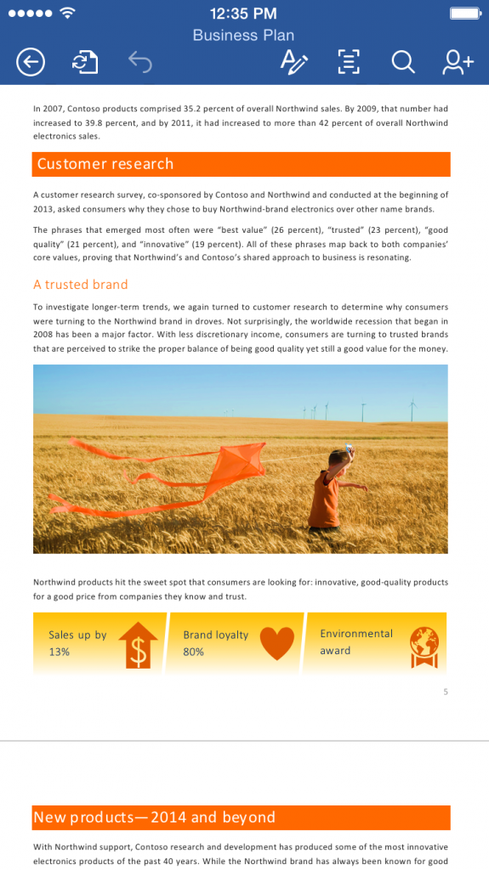Apple, Microsoft Fight For Financial CrownApple, Microsoft Fight For Financial Crown
Apple and Microsoft are the world's two most valuable companies, though neither is currently close to Microsoft's peak value from the dot-com era.


Microsoft Office Mobile: Right For You?
Microsoft Office Mobile: Right For You? (Click image for larger view and slideshow.)
Microsoft last week passed Exxon to become the world's second most valuable company by market capitalization. Microsoft's ascent partly reflects falling oil prices, which have caused investors to shed energy sector stocks such as Exxon. But it's also, and more prominently, another sign of Wall Street's confidence in Microsoft CEO Satya Nadella, who took over for Steve Ballmer less than a year ago but has already led the company to its highest stock prices in well over a decade.
Despite the good news, Microsoft still has a ways to go before it can challenge the world's most valuable company, Apple, which celebrated a financial milestone of its own last week. Apple's stock hit an all-time high of more than $114 per share, which pushed its market cap to almost $670 billion, also a record.
Adjusted for inflation, Apple's historic market cap is no match for Microsoft's value during the dot-com heyday, however. Microsoft's peak value in 1999 translates to more than $800 billion in today's dollars, though the company's stock fell sharply after the dot-com bubble burst. Its current market cap is just under $410 billion, around $6 billion more than third-place Exxon, and $35 billion more than fourth-place Google. As of Monday afternoon, Apple, Exxon, Microsoft, and Google were all down slightly.
[Want to learn what's behind Microsoft's success? See Microsoft's Strong Quarter: 7 Highlights.]
Microsoft's stock price has risen more than 30% since Nadella took over in February; the company’s stock has traded below $30 per share for most of the last five years, but the CEO has helped it to rally. Investors were especially hard on Microsoft following the release of Windows 8: As it became clear the OS was attractive to neither mobile nor desktop-oriented users, the company's market cap ranking slipped from third to ninth.
Initially, investors seemed to support Nadella simply because he wasn't Ballmer. In recent months, however, Nadella has begun to come into his own. Investors and analysts have praised his hybrid cloud emphasis, which pairs established products, such as Windows Server, with an emerging platform, Microsoft Azure. His cross-platform mobile strategies, such as the recent release of free Office apps for iPhones, have also won plaudits. Many have viewed even Windows 10, the follow-up to much-criticized Windows 8, with cautious optimism.
Apple's Wall Street gains are even bigger than Microsoft's; year-to-date, the iPhone-maker's stock is up over 40%. The company is riding a tidal wave of positive financial news, with record-breaking Mac sales last quarter, and record-breaking iPhone sales well underway this quarter. Slowing iPad sales might be a concern, but not enough to overshadow the company's obvious momentum. With its partnership with IBM, Apple has also pledged to increase its focus on enterprise customers, a group to which the late Apple CEO Steve Jobs rarely catered.
Apple's recent success with investors isn't all about products. The company's ongoing share repurchase efforts have also driven up stock prices, largely because Apple's purchases reduce the number of available shares, which increases demand for those that remain on the market.
Apple also recently caught the attention of activist investor Carl Icahn, whose social media theatrics have sometimes influenced the market. Best known as Dell CEO Michael Dell's nemesis, Icahn has vocally argued Apple is worth over $1 trillion. Since 2012, Apple has been the market cap leader for every quarter but one, so Icahn might be right. But his premise rests partly on tax opportunities Apple might not pursue and Apple Watch sales that might not materialize, so not all Wall Street observers are convinced.
Though Apple and Microsoft are both riding high, technology stocks continue to be prone to bursts of volatility. In September, for example, Apple lost $26 billion in market cap value in a single day. Samsung's launch of its Note 4 phablet and new virtual reality headset triggered Apple's stock losses. Apple has obviously rebounded in the subsequent weeks, while Samsung's stock, hampered by falling smartphone profits, has been up and down, at best.
Apply now for the 2015 information Elite 100, which recognizes the most innovative users of technology to advance a company's business goals. Winners will be recognized at the information Conference, April 27-28, 2015, at the Mandalay Bay in Las Vegas. Application period ends Jan. 16, 2015.
About the Author
You May Also Like






